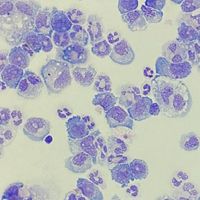Cell Cannibalism Leads to Improved Immunotherapy
The immune system targets pathogens and other invading foreign bodies through various mechanisms. Although many of these mechanisms seem straightforward, there is one particular method, known as phagocytosis, that scientists have focused on to improve cancer treatment. Phagocytosis is the process of an immune cell physically engulfing another cell to eliminate it. Phagocytosis was first described by the “Father of Innate Immunity”, Dr. Ilya Mechnikov, and is a combination of two words from the Ancient Greek: “phagein” (to eat) and “kytos” (cell).
A lab at the University of California, Santa Barbara (UC Santa Barbara) lead by Dr. Denise Montell investigated phagocytosis in fruit flies, which lead to implications concerning human cancer. The paper that concluded the findings of Montell, and others was published in the Proceedings of the National Academy of Sciences (PNAS). Montell’s group investigated a gene known as Rac Family Small GTPase 2 (Rac2) which is a fundamental gene encoded in humans that is responsible for developing a cell’s cytoskeleton. Montell’s group previously demonstrated the critical role of Rac protein in cell movement in fruit fly ovaries. They found that in fruit fly egg development, eggs not used or not needed became engulfed by neighboring cells. Rac2 is a protein necessary for this engulfment process and if overexpressed (or hyperactive) could prematurely activate cells to engulf others.
When studying the underlying cause of immunodeficient patients, Montell’s group noticed that they all had Rac2 mutation. Interestingly, these patients also had limited T cells present in the body. T cells are critical immune cells charged with killing foreign pathogens. Montell and others found that hyperactive Rac in these T cells seemed to vanish after their development. Researchers demonstrated, neutrophils, another immune population, expressing Rac2 were engulfing T cells. They also discovered that macrophages, an immune cell which conducts phagocytosis as a primary function, also engulfed T cells when overexpressing Rac2. These Rac2 expressing macrophages were found to phagocytose T cells at higher rates than neutrophils. Additionally, Rac2 activity in T cells made them more vulnerable to become engulfed. Overall, Montell’s team concluded that active Rac2 in different cell populations increased phagocytosis of T cells.
To improve clinical relevance, Montell and others collaborated to generate a combination therapy to effectively phagocytose cancer cells. The team generated engineered macrophages designed to kill cancer cells and expressed Rac2 in these engineered cells which caused significant tumor death. It also allowed researchers to specifically target cancer cells and leave healthy T cells alone since they did not express hyperactive Rac2. The engineered Rac2 macrophage therapy shows promise, however, it has only been concluded to effectively treat blood cancers, such as leukemia and lymphoma. Unfortunately, in solid tumors (breast, lung, pancreas) therapeutic efficacy is limited. Montell’s future work will further develop and take advantage of different animal models to effectively investigate this therapy.
Montell and others have taken foundational knowledge from a fruit fly and applied it to translational research. This is an outstanding example of moving basic science to the clinic. Overall, this work provides the potential to improve cancer therapy and improve survival rate in patients with leukemia and lymphoma.

















































